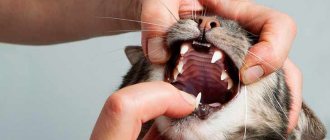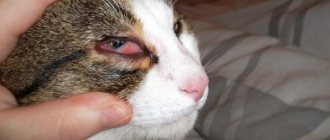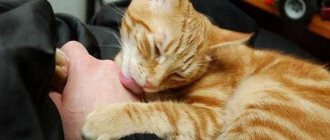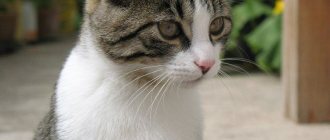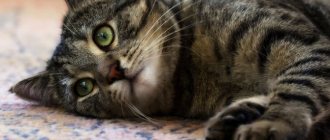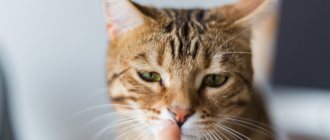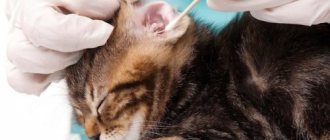Internal and external reasons can influence the fact that a cat develops blood from the mouth. In most cases, profuse bloody saliva occurs when vital organs—the liver, kidneys, stomach and intestines—are disrupted. If there is a problem, additional symptoms are recorded, such as broken stools, lack of appetite, restlessness, and more. As soon as the owner notices that the cat is dripping blood from its mouth or has bloody impurities in its nose, it is necessary to urgently seek veterinary help.
What to do if your cat is bleeding from the mouth?
The cat family is distinguished by its amazing vitality and intelligence, acquired in the process of evolution and centuries of life next to humans. However, a pet's body is also susceptible to destructive effects when the cat bleeds from the mouth.
Today we will talk about this phenomenon with maximum care, consider the causes of its occurrence, treatment and preventive measures.
Additional symptoms
This manifestation can be combined in an animal with severe shortness of breath, which remains with him even in a calm state.
When a cat has bleeding from the nose or mouth against the background of internal pathologies, other clinical signs are characteristic:
- scarlet discharge from the oral cavity along with the pet’s saliva;
- gagging with bloody spots;
- impurities of blood in feces and urine, and sometimes the stool takes on a dark shade, reminiscent of tar in color;
- shortness of breath not associated with physical activity;
- high body temperature;
- bad breath;
- increased fatigue;
- pale mucous membranes;
- rapid enlargement of the abdominal cavity.
Fundamental Concepts
If your pet is bleeding from the mouth, examine him, paying attention to:
- structure and condition of teeth and gums;
- possible damage to the lips;
- the color of the blood and its amount;
- presence/absence of odor, vomiting;
- general condition of the body: eating pattern, level of physical activity, muscle tone, thirst or dehydration.
Deviation from the norm in a cat of some indicators indicates the development of an unidentified disease. We strongly recommend that you seek qualified assistance on the same day.
Causes
Although bleeding from the mouth can indicate internal bleeding or kidney disease, it is more often associated with problems with the health of the gums and teeth. Some of the reasons why you may see blood coming from your cat's mouth include:
© shutterstock
- Cancer . The most common cancer that is characterized by bleeding from the mouth is oral squamous cell carcinoma, an invasive and malignant tumor that requires surgery and a combination of radiation and chemotherapy to treat. Bleeding due to cancer is often accompanied by weight loss, bad breath, and swelling in the growth area.
- Dental abscess . Dental abscesses, which are often caused by broken teeth, also cause drooling, difficulty eating, and scratching, especially on one side of the mouth. Swelling from abscesses is usually warm and painful and accompanied by bad breath.
- Foreign object stuck in mouth . Although cats are less likely to get objects stuck in their mouths than dogs, it does happen. Objects such as needles, bone splinters, or thorns can not only cause pain and bleeding in the mouth, but if the condition is left untreated, it can cause the object to become lodged in the throat and cause further damage, or can cause dangerous cavity infections mouth
- Gum disease . Gingivitis, swelling and inflammation of the gums, is a common oral disease in cats. Severe cases of gingivitis should be differentiated from stomatitis by blood tests or soft tissue biopsies; If left untreated, they can lead to bacterial and fungal infections.
- Internal bleeding . If your cat is bleeding internally, you may also see blood coming out of other openings, such as the nose or anus. Internal bleeding can force large amounts of blood out of the circulatory system, leading to severe weakness, bruising, breathing problems and ultimately, if left untreated, collapse and death. If you suspect your cat is bleeding internally, you should treat it as an emergency and take your cat to the nearest veterinarian immediately.
- Kidney disease . Kidney dysfunction is often characterized by some unique oral symptoms due to the high levels of urea excreted through the cat's saliva. Along with ulcerated mouth sores, this disease is accompanied by a strong odor of ammonia or urine from the mouth.
- Stomatitis . Stomatitis is an inflammation of the gums that causes ulcers that are very painful for your cat. This disorder often causes a reluctance to eat, and is sometimes so painful that it can even make you reluctant to drink or take care of yourself. Bloody saliva and metallic bad breath may be indicators of this serious condition.
- Mouth trauma . It is also possible for the mouth to be damaged by punctures, burns, or blows. Bleeding from an injury usually has little or no odor if left untreated, but an oral infection may develop if left untreated.
Why is this happening
It is quite difficult to discover the causes of an unknown disease, so we will divide the further narrative into several blocks.
Injuries to the oral cavity
Drip bleeding from the mouth occurs when the surface of the head is damaged (due to “showdowns” with competitors), sensitive walls (consumption of malignant products or objects of unknown origin).
If your cat is bleeding from the mouth, pay attention to:
- Color – shades of red or pink, depending on the degree of dilution.
- Duration - with minor injuries, blood stops flowing within ten minutes, tooth loss is accompanied by a longer period.
- The nature of the leak - liquid flowing out in jerks, indicates damage to an important vessel or large capillary of the facial area of the head.
To stop bleeding from the mouth, you will need cotton swabs treated with a manganese solution. If first aid does not bring results, contact specialized institutions.
Lung damage
If the respiratory system is affected, periodic foam from the cat's mouth mixed with pink blood is observed. The phenomenon is characterized by a small amount of fluid and no coagulation. If you notice such symptoms, immediately take your cat to a veterinary clinic.
Poisoning with toxic substances
After examining the cat's vomit, we can draw a conclusion about the nature of the ongoing disease. The presence of brown impurities indicates damage to the gastric mucosa. Often occurs due to: eating household chemicals, specialized mixtures.
If the cat has eaten rat bait, additional vitamin K injections and blood transfusions and rinsing by probing will be needed.
It is important to know! Do not induce vomiting if your cat eats toxic substances. A hasty decision can cause damage to the esophagus and respiratory organs from the moving masses.
Blood and liver damage
Problems with blood clotting indicate a destructive effect on the above-mentioned organs of the cat. Often occur during exacerbations of non-contagious diseases, and are not accompanied by the release of foam.
We recommend that you contact a veterinary clinic to submit biochemical analysis materials, a coagulogram and undergo highly targeted treatment.
Bleeding in the stomach
Vomiting blood in a cat is a sign of damage to the sensitive walls of the stomach. The discharge has a brown tint and an unpleasant smell, and the consistency resembles the thick of infused tea.
The frequency of exacerbation depends on individual characteristics, degree and nature.
An exacerbation is accompanied by sharp pain in the abdominal area, which can be relieved by eating several pieces of ice and applying cold compresses to the affected area.
It is important to know!
Blood flowing out of the mouth in a stream is a clear sign of “holes” in the vessels of the abdominal cavity or stomach . The question arises, what to do? The answer is extremely short - seek help from a veterinary clinic.
Treatment of bleeding
If the animal’s condition is not critical, then its recovery will depend only on medications.
When a cat is bleeding from the mouth and other symptoms are disturbing, individual therapy is selected, taking into account the cause and severity of the disorder. If the bleeding is external, associated with mechanical injuries, then first aid can be provided at home, after which the pet can be further examined by a veterinarian. When the pathology is caused by problems of internal organs and systems, then emergency treatment is required in a veterinary clinic. For dysfunction of the stomach, liver, intestines or lungs, treatment is aimed at eliminating the source of the underlying disease. With a mild degree of severity of the disease, it is possible to get by with medications, but if the case is advanced, and blood is released from the mouth more and more often, then surgical intervention cannot be avoided.
Blood from a cat’s mouth - what does this terrible symptom indicate?
Over the years, the cat family has evolved, which has led to the maximum survivability of cats. But even in modern times, animals can be subjected to various negative processes, in which a lot of unpleasant and life-threatening symptoms are observed. One of the severe processes is a condition in which bleeding comes from the cat’s mouth. A caring owner should know why a four-legged friend may bleed and how to prevent serious consequences.
Preventing Bleeding from the Mouth
Bleeding from the mouth is caused by a number of circumstances, some of which are easier to prevent than others. Foods that can splinter, such as chicken bones, should be avoided to prevent them from getting stuck in the mouth or throat and to prevent damage to the gastrointestinal tract that can lead to internal bleeding.
Outdoor cats may have an increased chance of suffering oral trauma from cars, predatory animals, and even other cats, as well as a higher chance of ingesting poisons such as snail bait or plant fertilizers.
Regular visits to the veterinarian are critical for cats, especially since they are adept at hiding discomfort, and these visits can be helpful in identifying any systemic infections or organ dysfunction before any symptoms appear. Regular dental care is especially important when dealing with problems that cause bleeding from the mouth in cats.
Proper examination of the animal
The first thing the owner of a furry cat should do is to carefully examine the oral cavity of the cat, as well as the entire body of the pet. During the inspection, you need to pay attention to the following aspects:
- condition and structure of all teeth and gums;
- assess the integrity of the tissues of the cheeks and lips, both internally and externally;
- the color of the blood and the location of its flow;
- determine whether your pet has the urge to vomit;
- presence of fetid odor of bloody discharge.
Along with the above points, you should remember what was in the pet’s diet, what food it ate, and whether there were situations where the animal could have been injured. It is also very important to assess for dehydration. If the cat has not drunk for a long time due to the injury, then you should give some water by pouring it through a syringe without a needle. Dehydration of the body is fatal. It should be remembered that cats have metabolic processes much faster than humans, so dehydration is very dangerous. During the examination, the general condition of the animal is also assessed, the presence or absence of muscle spasms and convulsions is determined.
Why are bleeding dangerous?
The body of any animal contains a certain amount of blood: freely circulating and deposited in various organs. Any bleeding leads to the loss of some amount of blood from the bloodstream.
The animal body has a powerful mechanism for regulating and redistributing the volume of circulating blood, which allows maintaining the effective functioning of vital organs in conditions of blood loss. But everything has its limit. Minor blood losses, if they are infrequently repeated, pass without a trace for the body.
Severe bleeding due to rupture of large blood vessels (for example, carotid arteries, thoracic and abdominal aorta, vena cava) results in instant death. Damage to smaller vessels and internal organs, especially through which a large amount of blood passes every minute (spleen, liver, kidneys, lungs), also poses a great danger to the life and health of animals.
After significant blood loss, the mechanics of blood circulation are disrupted due to insufficient filling of blood vessels and the heart and a drop in blood pressure. Acute anemia develops, which is expressed in a sharp decrease in the number of red blood cells in the blood and a decrease in hemoglobin levels. As a result, the process of oxygen delivery to organs and tissues is disrupted.
Hypoxia (oxygen starvation) of tissues occurs, local metabolic processes are disrupted, cell death occurs and, as a consequence, the death of the entire organism. The maximum amount of blood loss that leads to death depends on the age, species and individual characteristics of the animal. Animals that have lost 2/3 - 3/4 of their total blood mass, as a rule, cannot be saved.
Diagnosis and treatment of bloody discharge from the mouth of a cat
When the owner notices that the cat is vomiting and there is blood in the vomit, it is necessary to immediately contact a veterinarian. There are a number of measures that the owner can provide independently at home to alleviate the animal's condition.
First of all, you need to put your pet on a fasting diet for at least 12 hours. Otherwise, the passage of food through the digestive tract can cause additional damage to the mucous membrane, and the body will spend additional energy on recovery. You can give your pet a warm decoction of chamomile.
The animal is unlikely to drink such a healing infusion on its own, so the cat will need to be fed in small portions. Even if the animal’s condition has stabilized, you should not postpone a visit to the veterinarian.
In a veterinary hospital, before taking treatment measures, it is necessary to undergo all studies and tests. The doctor must conduct a clinical examination of the sick pet and also collect an anamnesis. Auxiliary diagnostic measures are:
- blood chemistry;
- analysis for viral infection;
- stool analysis.
Depending on the clinical picture of manifestations, the range of diagnostic measures can be expanded. Thus, if a foreign object is suspected of entering the digestive tract or a malignant tumor, an ultrasound examination or computed tomography is recommended.
Often, an X-ray examination is necessary to make an accurate diagnosis. Based on a comprehensive study, the veterinarian selects an individual treatment regimen for each animal, taking into account the age, body weight and health status of the patient.
If the cause of your cat's nausea and vomiting of blood is chemical poisoning, treatment should first include administering an antidote. In case of poisoning with rat poisons, gastric lavage is performed and vomiting is induced in a hospital hospital setting.
Next, treatment is carried out by introducing special medications that neutralize toxic substances in the body and also promote their rapid elimination.
When poisoned by rat poisons, the cat is given shock doses of vitamin K, which helps stop bleeding and normalizes blood clotting factors. Normalization of water and electrolyte balance is carried out by infusion of Ringer-Locke and glucose solutions through a dropper. Enterosorbents and enveloping agents are also indicated.
In special cases, in case of severe poisoning, blood transfusions are performed on the animal, but unfortunately, not all veterinary clinics can afford this procedure.
If the cause of bloody vomiting is damage to the mucous membrane of the stomach walls as a result of ulcerative lesions, therapy is aimed at eliminating the inflammatory process by administering special drugs. An important point in the treatment of stomach ulcers is special dietary nutrition.
The entry of foreign objects into the esophagus, stomach or intestines, causing bloody vomiting, can only be treated surgically. During surgery, the affected part of the digestive tract is excised, tissue is sutured, and postoperative care and medications are prescribed.
In case of liver dysfunction, hepatoprotectors and drugs that relieve inflammation are prescribed. It is also necessary to constantly monitor the animal’s condition and prescribe a gentle diet. Most often, an animal with pathological changes in the liver structures is forced to be treated for the rest of its life.
Less dangerous pathologies accompanied by bleeding from the oral cavity in cats are damage to the mucous membrane of the mouth. But if treatment is not timely, the situation may worsen and then the treatment of the animal will be longer.
Severe bleeding from the mouth caused by a rupture of a large vessel requires immediate medical intervention. The blood must be stopped by applying cold (to narrow the lumen of blood vessels), as well as by administering vitamin K. It is also necessary to administer antibacterial drugs to prevent the development of pathogenic microflora in the animal’s oral cavity.
